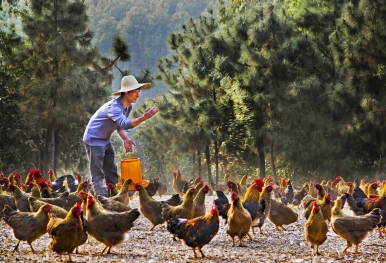Dear friends,
At 12 noon on 20 December 2017 the United Nations General Assembly in New York officially adopted the Decade on Family Family Farming. Furthermore, it was adopted with an enormous support: 104 countries co-sponsored the Resolution (104!) and it was finally adopted unanimously.
It took a year and a half of hard work to achieve that. The WRF held dozens of meetings with governments from every continent, mobilized hundreds of civil society organizations, prepared a whole series of drafts for negotiation in the United Nations General Assembly, made a major effort to disseminate and communicate information, empowered the Costa Rican Family Farming Network (National Committee) and made several trips to New York and to Rome to be on hand to stimulate the process. The WRF Secretariat and the whole organization devoted enormous effort to achieving this objective together.
We want also to recognize the important role in achieving the declaration played by the World Coordination Committee for IYFF+10, the family farmers organizations, international organizations (mainly IFAD, the FAO, the ILC and the IICA), national governments (particularly the government of Costa Rica which deserves special mention for its excellent work), regional integration bodies (REAF, CPLP, CELAC), research centres and other civil society organizations
It is important to emphasize that the Resolution adopted explicitly acknowledges the success of IYFF 2014 and the important part played by the National Committees on Family Farming in achieving that success. The official text of the Resolution includes some very interesting features: promoting farmer-to-farmer exchange of experiences, adopting an inclusive definition of family farming (which includes forestry, aquaculture, pastoralism and artisanal fishing). The Resolution also recognizes the fundamental role of women and young people in family farming.
In addition to having the Decade declared in 2017, the network of National Committees on Family Farming (NCCF) has been expanding. The inclusion of new countries such as Fiji, Macedonia, Chad and Japan brings the number of active Committees to over 40 and they are playing an outstanding part in generating public policies in their countries.
The Challenge Fund to support National Committees on Family Farming which we are managing (cofinanced mainly by IFAD, the FAO and FOCAD) is being used primarily to fund the initiatives of 12 NCFFs (Indonesia, the Philippines, Madagascar, Senegal, Burkina Faso, the Ivory Coast, Uganda, Kenya, the Dominican Republic, Honduras, Costa Rica and Paraguay) and to help set up three other committees (Fiji, Macedonia and Chad). Improvements have been made to public policies for Family Farming in Paraguay, the Philippines, Slovakia and Uganda. For example, the Slovakian NCFF has completed an intensive process which has resulted in the country’s land acquiring constitutional protection against speculative acquisition through a constitutional law approved by parliament on 16 May 2017.
We are also pleased to note that the Community of Portuguese-Speaking Countries (CPLP) has approved its Regional Guidelines in support of Family Farming. The Specialized Meeting on Family Farming (REAF) has also reached an agreement to begin designing their own guidelines for public policies specific to family farming.
In our own work on promoting participatory research, we have made progress on defining a concrete proposal in collaboration with farming organizations and rural associations under the auspices of the GFAR (Global Forum on Agricultural Research).
At internal level, the WRF began to reform its statutes in 2017 to bring them into line with current realities and prepare more effectively to meet future challenges. Here at the WRF Secretariat we have been endeavouring to become ever closer to our members by setting up a virtual communication and consultation system. If the General Assembly so decides, we shall be welcoming a new associate, an important ally in Africa – PROPAC, a network of ten Central African countries’ farming organizations.
By having the IYFF+10/Decade of Family Farming 2019-2028 declared, we have jointly created a massive opportunity to seek substantial changes which would improve the lives of family farmers across all five continents. We must seize the crucial opportunity that has been created. The difficult part begins now. We are well aware of the major responsibility resting on our organization at this important juncture and we are determined to fulfil it.
Our organizations history shows us that we are capable of achieving what we set out to do, as long as we work together, with humility, ambition and perseverance.
Kind regards,
Auxtin Ortiz,
Director of the World Rural Forum



